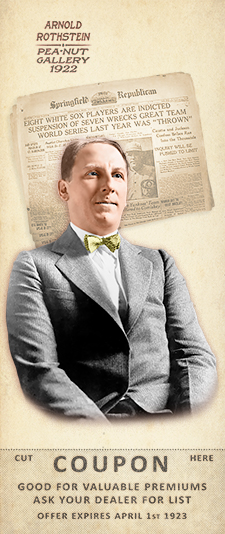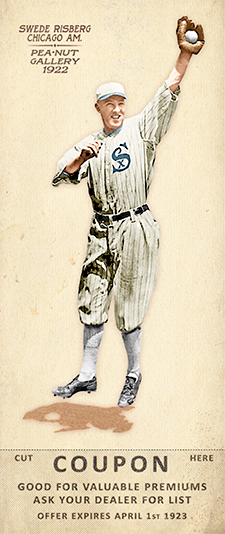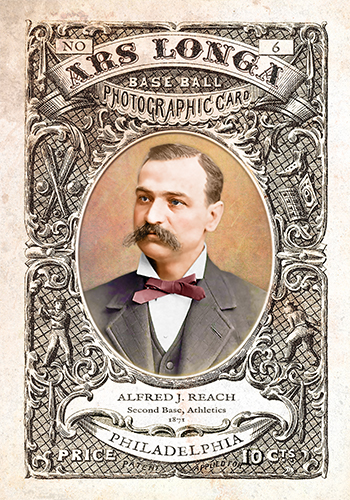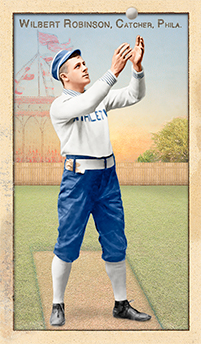
- Series: 1919 Black Sox Scandal
Arnold Rothstein (1882-1928) has been described by historian Leo Katcher as “the J.P.Morgan of the underworld; its banker and master of strategy.” Born into a wealthy New York Jewish family, Rothstein would use his vaunted intelligence to rise to the top of criminal enterprises. Nicknamed the Brain, the Fixer or the Big Bankroll, he was most often known to his underlings as A.R.; and underlings he had. Rothstein was mentor and boss to some of the most notorious gangsters of the 20th century: Meyer Lansky, Legs Diamond, Dutch Schultz, Frank Costello and Lucky Luciano, who said of A.R., “He taught me how to dress...how to use knives and forks and things like that at the dinner table, about holdin’ a door open for a girl. If Arnold had lived a little longer, he could’ve made me pretty elegant.”
Rothstein is credited with making crime a business, using his acumen to organize a network of illicit operations, the godfather before there was a Sicilian Godfather. Per Lansky, “Rothstein had the most remarkable brain. He understood business instinctively and I’m sure that if he had been a legitimate financier he would have been just as rich as he became with his gambling and the other rackets he ran.” His instincts proved very acute when his bodyguard Abe Attell brought him Chick Gandil’s plot to fix the 1919 World Series. Rothstein is said to have rejected the scheme, accurately assessing the harebrained crew of conspirators. After learning that other groups of gamblers were getting involved, some say he fronted $80,000 and then won a fortune betting on the White Sox to lose.
Those bets presaged later huge takes at the track and poker tables that made A.R. the most famous criminal of an increasingly lawless era. The year after the Series fix, Rothstein found the greatest opening a crime lord ever had as Prohibition began. He made massive profits, but got out of the traffic early as he realized he couldn’t control the liquor business to his liking. He was all about control, once remarking that he would bet on anything but the weather because “I can’t fix the weather.”
- As with all of the players and gamblers directly implicated in the Black Sox scandal, Rothstein escaped legal consequences. He testified that he had been asked to participate, but always denied a role
- Slain by a card player who said A.R. had stiffed him on a $300,000 marker, Rothstein took a day to die, taking his killer’s identity to the grave. In a gesture to honor Arnold's upright father, his funeral was officiated by New York’s most prominent Orthodox rabbi

- Series: 1919 Black Sox Scandal
- City: Chicago
- Team: White Sox
- League: American League
Charles August Risberg (1894-1975) grew up on the streets of San Francisco, dropping out of school in the third grade. He had a flair for baseball and, when he switched to shortstop, he blossomed into a defensive star worthy of a call-up to the White Sox in 1917. Swede’s minor league experience foreshadowed the future outlaw character he would display almost from his arrival in the big leagues. In 1913, when Risberg traveled to the LA area to play in the Pacific Coast League, he was drawn to the Vernon/Venice Tigers. At that time these were the only communities in Los Angeles county that were “wet.” Booze was the defining identifier for owner Pete Maier’s club. When it was in Vernon fans could enter the park directly from Doyle’s bar.
Risberg made the big club based on his defense, but hit so poorly in his rookie season that he only got two pinch hitting appearances in the ‘17 Series when the Sox beat the Giants. Swede returned to California for part of the 1918 season, escaping the draft by taking a shipyard job that amounted mostly to playing semi-pro ball for the company during that “work or fight” year. By his own testimony, Swede was crooked throughout his major league tenure, all with Chicago. He claimed to have been the organizer of a scheme in 1917 to bribe Tiger players to throw some games. And he was at the center of the Black Sox Scandal in 1919. Later many would assert that, despite the clear conspiracy with gamblers, the Reds won fair and square although they were thought to be far inferior to Chicago. It is difficult to make a case from the players’ performance. Risberg would be an exception. He apparently threw himself into the fix with zeal, committing a record eight errors and going 2 for 25 at bat. And his reported payout of $15,000, which was more than four times his salary, was a far bigger reward than others realized. He may have earned his bonus because he served as an enforcer. Joe Jackson received a death threat from Risberg if he “blabbed.” Shoeless Joe would later describe Swede as a “hard guy.”
- True to his scofflaw nature, Risberg defied Judge Landis’ ban and played exhibition ball for years. As the youngest of the “Eight Men Out,” and having a very brief tour in the majors, he had incentive to play wherever he could
- It may be that the game he tarnished got its revenge. Swede had been spiked in Chicago and the wound never properly healed. He lost the leg in his old age, dying in a nursing home in Redding, CA on his 81st birthday
- Series: Beginnings: 1880's
- City: Philadelphia
- Team: Athletics (AA)
- League: American Association
- Hall: National Baseball Hall of Fame
Uncle Robbie (1863-1934). A durable catcher for 17 seasons with 3 teams, Robinson is credited as the 1st to play directly behind the plate at all times. Uncle Robbie once caught 5 games in two days. He also had 7 hits & 11 RBI in a single game. After his playing days were over, Robinson went on to manage for 18 seasons.
- Won 3 NL pennants as player
- Won 2 NL pennants as manager
- Won 5 NL pennants as pitching coach
- Elected to Hall of Fame: 1945

- Series: Athletic of Philadelphia: 1874
- City: Philadelphia
- Team: Athletics (NAPBBP)
- League: National Association (NAPBBP)
This cabinet is currently on the drawing board and is coming soon.
Alfred James Reach (1840-1928) “served baseball with distinction as player, organizer, club owner and provider of the equipment to attain the highest possible skill in the game,” per his own Reach’s Official Base Ball Guide upon his death. “A good man, of the kindest impulses, his name will last as long as we have baseball” expressed the legacy of one of the great men of the early era of America’s game. The London-born, Brooklyn-raised Reach joked that he made the gloves he eschewed in the beginnings of the game in which he starred for the Brooklyn Eckfords and Philadelphia Athletics. He also made the AL’s balls while owning the NL Phillies franchise. A genius for marketing equipment and a lifelong love of the game made him one of the most influential figures of baseball’s first half-century.
- Began play in the amateur era and was a stalwart of the NABBP, first with the Brooklyn Eckfords from 1861-1864, then with the old Athletics of Philadelphia, from 1865-1870
- Made the transition with the Athletics from the NABBP to the NAPBBP in 1871, helping the team win the first professional baseball pennant that year
- Retired from play with the demise of the NAPBBP after the 1875 season
- Founded the NL’s Philadelphia club in 1883, still going strong today as the Philadelphia Phillies
- Built the first modern ballpark in 1887, then rebuilt it with steel after a fire in ‘94
- Al's brother Bob Reach was an MLB shortstop for 3 games, 1872-1873
- Was the 80th player to debut in MLB

- Series: Mort's Reserve
- City: Philadelphia
- Team: Athletics (NAPBBP)
- League: National Association (NAPBBP)
Alfred James Reach (1840-1928) “served baseball with distinction as player, organizer, club owner and provider of the equipment to attain the highest possible skill in the game” per his own Reach’s Official Base Ball Guide upon his death. “A good man, of the kindest impulses, his name will last as long as we have baseball” expressed the legacy of one of the great men of the early era of America’s game. The London-born, Brooklyn-raised Reach joked that he made the gloves he eschewed in the beginnings of the game in which he starred for the Brooklyn Eckfords and Philadelphia Athletics. He also made the AL’s balls while owning the NL Phillies franchise. A genius for marketing equipment and a lifelong love of the game made him one of the most influential figures of baseball’s first half-century.
- Began play in the amateur era, then founded the NL’s Philadelphia club in 1883
- Built the first modern ballpark in ’87, then rebuilt it with steel after a fire in ‘94
- Al's brother Bob Reach was an MLB shortstop for 3 games, 1872-1873
- Was the 88th player to debut in MLB




